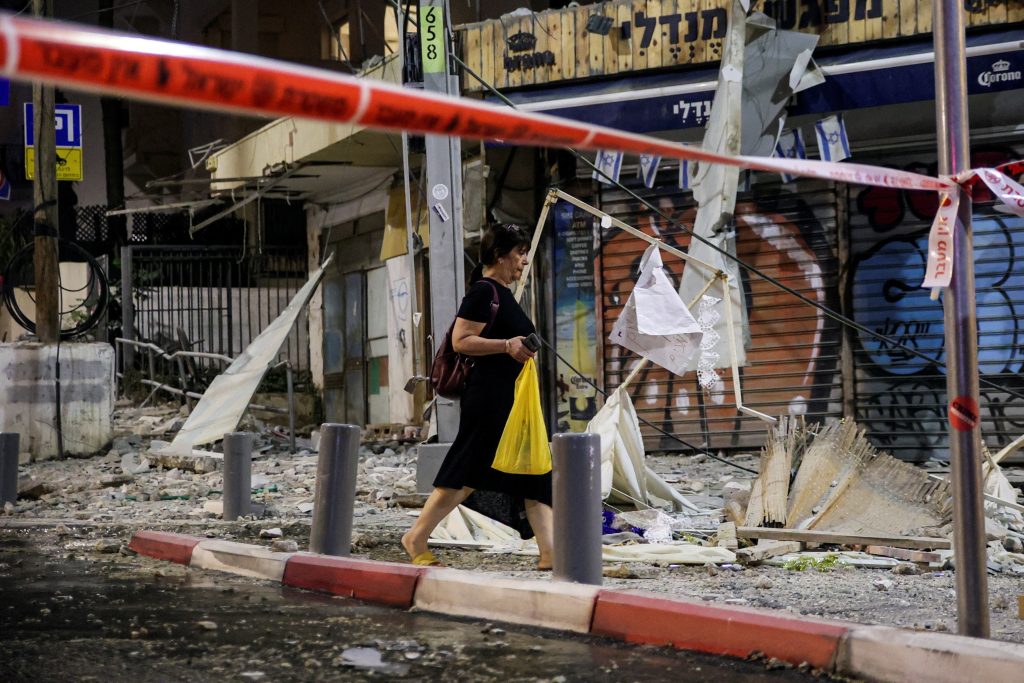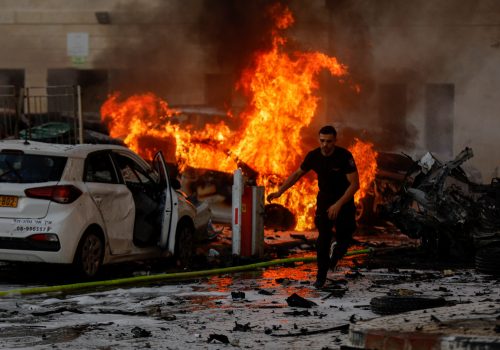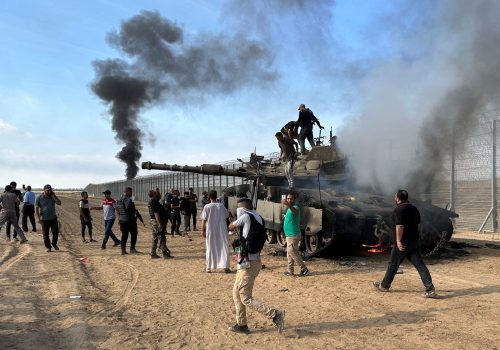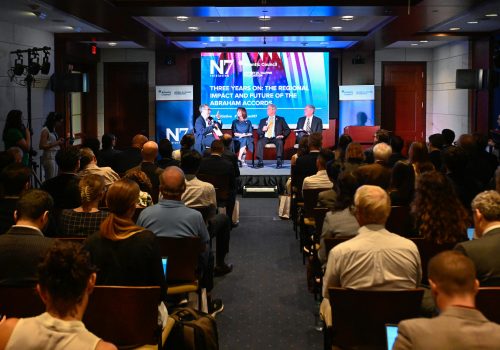TEL AVIV—I took the redeye flight from Washington to Tel Aviv on Friday night, preparing to host a historic multilateral conference on regional economic integration with government officials from Israel, the United States, and multiple Arab and Muslim countries. But I arrived here on Saturday to find a country reeling from the most significant surprise military attack in fifty years. Our conference has now been postponed and Israel is girding for war. What a difference a day makes.
Ever since Hamas defeated Fatah in the 2007 Battle of Gaza, only two years after Israeli disengagement from the territory, the rhythm of the Israel-Hamas conflict had become increasingly routine, with regular Hamas terrorism followed by predictable Israeli reprisals. Whenever the destructive cycles became especially violent, outside mediators would help negotiate a temporary ceasefire. Israel would typically accomplish its primary goal of enhancing its security, and Hamas would usually accomplish its goal of presenting itself as the leader of the “resistance.” And the people in Gaza, those who Hamas claims to support, would continue to suffer.
This routine is no more. Hamas has proven itself more operationally ambitious and tactically capable than anticipated. Proportionately, the casualties that Israel suffered today add up to a bigger blow than the one the United States experienced on 9/11. The Israeli military response will reflect that reality, with ground operations accompanying air strikes. The likely result will be a significantly degraded Hamas and substantial destruction within Gaza. And just as 9/11 proved to be a long-term strategic mistake for Al Qaeda, 10/7 will likely prove to be a similar strategic mistake for Hamas.
Indeed, the only way Hamas can achieve anything resembling a victory in the war to come is if other actors make decisions in the days ahead that further Hamas’s strategic objectives. All eyes will be on the leadership of the Palestinian Authority to see if it will be able to walk a fine line, as it has done before, offering rhetorical support to the people of Gaza while preventing a parallel outbreak of violence in the West Bank. If it fails, or if it chooses a different path this time, Israel will confront a two-front war and Hamas will go a long way toward achieving its primary goal: positioning itself for a sequel to the 2007 Battle of Gaza on the day after Palestinian Authority President Mahmoud Abbas dies.
Similarly, Hamas is already actively encouraging Arab Israelis to rise up, along the lines of the violence in 2021 that surprised many observers. Should this happen, the damage done to the long-term viability of Israeli society will be severe. Indeed, preventing this outcome by seeking to improve the livelihoods of Arab Israelis should be among the top strategic priorities of any Israeli government.
But it is Hezbollah and its patron Iran that pose the greatest immediate threat of turning the emerging Israel-Hamas war into a wider and far more damaging regional conflagration—Hamas’s ideal outcome. This evening, I had to shelter three times when Tel Aviv’s sirens went off, and the echoes of Iron Dome could be heard in the not-comfortably-far distance. I was never overly concerned, however, confident that Hamas does not actually pose a strategic threat to the city.
I would not be so sanguine if Hezbollah decided to join the war. And this might not require a clear intent such that Hamas just demonstrated; the last Israel-Hezbollah war in 2006 was an accident that neither side wanted, but it happened anyway. After that war, Hezbollah concluded that its operations didn’t have the desired effect because they lacked precision and scale—today, thanks to Iran, they possess both. And back then, Israel concluded that its operations didn’t have the desired effect until they expanded the rules of engagement to include military targets that were shielded within civilian populations. Given both of these conclusions, one should expect that the next Israel-Hezbollah war will escalate especially rapidly, with sizable casualties on both sides.
And finally, the international community can also help advance Hamas’s agenda if it fails to recognize the new nature of this conflict and instead reflexively repeats the threadbare slogans that have accompanied previous cycles of Israel-Hamas clashes. No matter how thoroughly one disagrees with Israel’s approach to the Palestinian people, or how easy it is to pander to a domestic audience that is inclined against Israel, it takes a special kind of moral blindness to blame Israel for Hamas’s butchery.
At the same time, those leaders who have taken courageous steps to build a fundamentally less divided and more integrated region, most recently through the Abraham Accords, should stay wedded to this superior vision of the future, one that is antithetical to Hamas’s aims. And those who are considering following suit—most notably the leaders in Riyadh—should not allow Hamas to deter them from this path.
William Wechsler is the senior director of Middle East Programs at the Atlantic Council. His most recent US government position was deputy assistant secretary of defense for special operations and combatting terrorism.
Further reading
Sat, Oct 7, 2023
Experts react: Israel is ‘at war’ after Hamas militants launch major assault
New Atlanticist By
The Palestinian militant group Hamas launched its boldest assault on Israel in decades. Atlantic Council experts offer their thoughts on the events.
Sat, Oct 7, 2023
Is the Hamas assault on Israel the beginning of a wider war?
Fast Thinking By
On Saturday, Hamas militants infiltrated Israel in a brazen, sophisticated attack that killed more than one hundred and injured hundreds more.
Fri, Sep 15, 2023
A Saudi-Israeli deal is not happening just yet. But there are other ways to expand the Abraham Accords.
New Atlanticist By Katherine Golden
Officials convening at the US Capitol discussed the economic and cultural projects that can expand the Accords' impact and spread prosperity in the Middle East.
Image: A woman walks past the site where a rocket launched from the Gaza Strip landed in Tel Aviv, Israel October 7, 2023. REUTERS/Itai Ron ISRAEL OUT. NO COMMERCIAL OR EDITORIAL SALES IN ISRAEL



